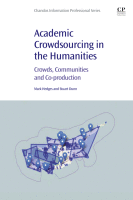Browse content
Table of contents
Actions for selected chapters
- Full text access
- Book chapterAbstract only
Chapter 1 - Introduction: Academic crowdsourcing from the periphery to the centre
Pages 1-12 - Book chapterAbstract only
Chapter 2 - From citizen science to community co-production
Pages 13-25 - Book chapterAbstract only
Chapter 3 - Processes and products: A typology of crowdsourcing
Pages 27-49 - Book chapterAbstract only
Chapter 4 - Crowdsourcing applied: Case studies
Pages 51-69 - Book chapterAbstract only
Chapter 5 - Roles and communities
Pages 71-85 - Book chapterAbstract only
Chapter 6 - Motivations and benefits
Pages 87-103 - Book chapterAbstract only
Chapter 7 - Ethical issues in humanities crowdsourcing
Pages 105-125 - Book chapterAbstract only
Chapter 8 - Crowdsourcing and memory
Pages 127-145 - Book chapterAbstract only
Chapter 9 - Crowds past, present and future
Pages 147-158 - Book chapterNo access
Bibliography
Pages 159-168 - Book chapterNo access
Index
Pages 169-174
About the book
Description
Academic Crowdsourcing in the Humanities lays the foundations for a theoretical framework to understand the value of crowdsourcing, an avenue that is increasingly becoming important to academia as the web transforms collaboration and communication and blurs institutional and professional boundaries. Crowdsourcing projects in the humanities have, for the most part, focused on the generation or enhancement of content in a variety of ways, leveraging the rich resources of knowledge, creativity, effort and interest among the public to contribute to academic discourse. This book explores methodologies, tactics and the "citizen science" involved.
Academic Crowdsourcing in the Humanities lays the foundations for a theoretical framework to understand the value of crowdsourcing, an avenue that is increasingly becoming important to academia as the web transforms collaboration and communication and blurs institutional and professional boundaries. Crowdsourcing projects in the humanities have, for the most part, focused on the generation or enhancement of content in a variety of ways, leveraging the rich resources of knowledge, creativity, effort and interest among the public to contribute to academic discourse. This book explores methodologies, tactics and the "citizen science" involved.
Key Features
- Addresses crowdsourcing for the humanities and cultural material
- Provides a systematic, academic analysis of crowdsourcing concepts and methodologies
- Situates crowdsourcing conceptually within the context of related concepts, such as ‘citizen science’, ‘wisdom of crowds’, and ‘public engagement’
- Addresses crowdsourcing for the humanities and cultural material
- Provides a systematic, academic analysis of crowdsourcing concepts and methodologies
- Situates crowdsourcing conceptually within the context of related concepts, such as ‘citizen science’, ‘wisdom of crowds’, and ‘public engagement’
Details
ISBN
978-0-08-100941-3
Language
English
Published
2018
Copyright
Copyright © 2018 Elsevier Ltd. All rights reserved.
Imprint
Chandos Publishing
